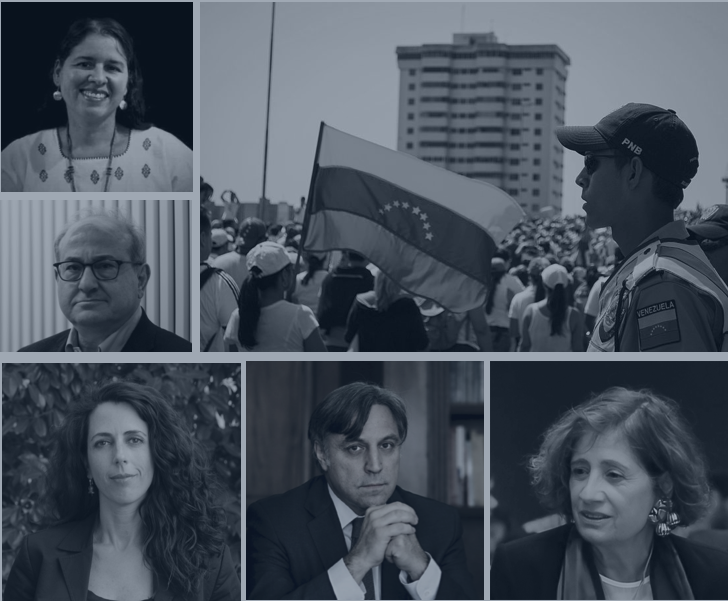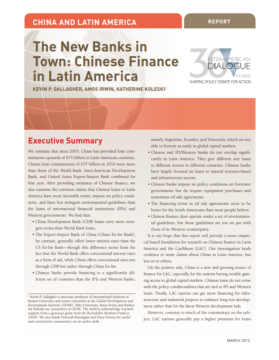Hugo Stay Home
Hugo Chavez, the Venezuelan president, has clearly been enticed by the Libyan drama, where his longtime friend and ally, Muammar al-Qaddafi, is under siege from rebel forces.
On March 1st, 2022, the Inter-American Dialogue co-hosted a panel with the Washington Office on Latin America titled "The Venezuelan Judiciary and Crimes Against Humanity- Justice or Impunity?" to discuss the reports from a UN Independent International Fact-Finding Mission on Venezuela. The panel was introduced by Michael Shifter, president of the Inter-American Dialogue, and moderated by Carolina Jiménez Sandoval, president of the Washington Office on Latin America. The panel consisted of the three members of the Fact-Finding Mission: Marta Valiñas, a specialist on international criminal justice and chairperson of the Mission, Patricia Tappatá Valdez, a human rights defender specialized in transitional justice and democracy, and Francisco Cox Vial, a human rights and criminal defense lawyer.
Valiñas began by summarizing the findings in the two reports—starting with the mandate to investigate claims of extrajudicial execution, torture, and sexual and gender-based violence conducted by the Venezuelan government since 2014. The first report concluded that there were reasonable grounds to believe that the human rights violations committed by Venezuelan authorities amounted to crimes against humanity. The second report detailed how impunity and a flawed judicial system with a close relationship to the president allowed the atrocities to continue. It concluded with a call for an independent judiciary. Valiñas continued to express her hope that the report will serve as a basis for future judicial accountability efforts and inform current advocacy efforts. She and the panelists want to ensure continued attention on the human rights violations in Venezuela, so it is not a "forgotten crisis."
Now that the research has been done, Vial, Valiñas, and Valdez discussed how their findings could be translated into tangible changes. Valdez spoke on the proposed reforms on the Venezuelan judicial system, saying that any reforms would need to happen alongside improved government transparency. While not impossible, she emphasized that "it will be a difficult road." Vial pointed to the disconnect between the laws and reality. Just because there are changes in the law does not mean there will be changes in practice. He gave Venezuela's penal processing laws as an example of a well-designed set of laws whose biggest flaw is that they are not followed. There must be international oversight if any reforms are to be effective. Vial asked that the international community provide oversight of the selection of judges, the relationship between the judiciary and the president, and in elections.
Now that the fact-finding Mission had concluded two reports, they were preparing to present their findings in September and find out if their mandate had been renewed. Valdez was firm in her belief that because the crimes against humanity in Venezuela have not stopped, neither should their mandate. There are still lines of investigation that the Mission wants to explore- different types of crimes not in their original mandate and a more focused look into who is ultimately responsible for the atrocities. At the very least, Valiñas said, the reports reveal to the International Criminal Court (ICC)- which recently opened an investigation in Venezuela- that there is a wealth of information to be found and plenty of people willing to talk. They hope that their work can serve as the basis for concrete steps forward in Venezuela.
The panel then took questions from the audience and spoke on recent developments in Venezuela, including the appointment of a new Supreme Tribunal. Sandoval asked if this was an indicator of change. Valiñas was doubtful, saying that on the one hand, they were pleased to see attempts to solve the issue of judicial corruption, but on the other, the new provisions give the National Assembly too much power in terms of the selection of justices. The fear is that appointments will once again become too political, and the system of checks and balances will be disrupted. A memorandum of understanding between the Venezuelan government and the ICC's office of the prosecutor also gave hope to a new chapter of Venezuelan governance. Vial was optimistic, saying that this initial collaboration in the ICC's investigation was promising since Maduro could have closed Venezuela off to the ICC completely but didn't. However, the panel emphasized that true reform won't happen without the involvement of external parties. Valdez specifically called on countries in Latin America, saying that the Venezuelan crisis is harmful to all surrounding nations and that it is their responsibility to act. The crucial prerequisites for an independent judiciary—the fair appointment of judges, a transparent government, free and fair elections—are just the first steps to stopping crimes against humanity in Venezuela.
Sandoval concluded by thanking the panelists and congratulating them on their report for being so thorough while giving voice to the victims. She reiterated the importance of the Mission's mandate to be renewed to continue their work.
Hugo Chavez, the Venezuelan president, has clearly been enticed by the Libyan drama, where his longtime friend and ally, Muammar al-Qaddafi, is under siege from rebel forces.
Estimates of the volume, composition, and characteristics of Chinese lending to the region since 2005.
Is the Venezuelan government likely to comply with the IACHR’s ruling or will it uphold the ban?
 Main photo: María Alejandra Mora / Wikimedia Commons / CC 3.0 https://commons.wikimedia.org/wiki/File:Marcha_hacia_el_Palacio_de_Justicia_de_Maracaibo_-_Venezuela_11.jpg
Main photo: María Alejandra Mora / Wikimedia Commons / CC 3.0 https://commons.wikimedia.org/wiki/File:Marcha_hacia_el_Palacio_de_Justicia_de_Maracaibo_-_Venezuela_11.jpg
